|

The Grove Area
Page and some links last revised/updated 17th June 2025.
This area covers part of The Grove (also known as Grove Road) and the housing estate on its southern side.
Until the prison was built this area was virtually uninhabited and known as Grove Fields. The road was built to service the prison and it was from this date that the houses started to be built and the area became residential.
To the north of Grove Road used to be extensive quarries and Victorian tourists would travel from as far as London to sit in the upstairs rooms of houses in The Grove and, for six pence, enjoy tea, cakes and watching the convicts working.
That's probably why there were once no fewer than six pubs in The Grove.
The Clifton Hotel is at [1] on the above map and, in the same immediate location are two abandoned shops and Post Office as well as the closed Catholic Church.
At [2] on the map is a row of flats which replaced houses in Augusta Road destroyed by Luftwaffe bombing in World War 2. There were four deaths and a miraculous escape by baby Gerald Harding.
At [4] is the Rufus Way estate which is built on an old infilled quarry whilst at [5] is one of the most extensive cave systems on Portland.
St Peter’s Church [6] is interesting as it was the Grove Prison Church many years ago and prisoners contributed to its decoration.
Please click here for a detailed map. Click the BACK button on your browser to return to this page.
Please click here to visit the satellite image of this area on Google Maps. Click the BACK button on your browser to return to this page. Please click here to visit the Google Streetview image of this area. Click the BACK button on your browser to return to this page.
|
Please use this table to navigate around this page
|
|
THE CLIFTON HOTEL [1]
|

|
|
THE ABANDONED POST OFFICE [1]
|

|
|
THE CLOSED CATHOLIC CHURCH [1]
|

|
|
AUGUSTA ROAD BOMBING DEATHS [2]
|

|
|
A CLOSED SHOP [3]
|

|
|
RUFUS WAY ESTATE [4]
|

|
|
LITTLE FRANCE QUARRY AND CAVE SYSTEM [5]
|

|
|
St PETER’S ‘PRISON’ CHURCH [6]
|

|
|
GROVE SCHOOL [7]
|

|
|
ALMA TERRACE [8]
|

|
|
GROVE PRISON FARM [9]
|

|
|
THE CLIFTON HOTEL [1] (Since closed as a pub. Section updated 17 June 2025)
The Clifton Hotel was the last left of half a dozen pubs in The Grove. Pubs thrived here in Victorian times when huge numbers of visitors would travel from as far away as London to spend the day watching prisoners working in the quarries to the north of The Grove. Below we see typical scenes that visitors would have travelled far to see over the wall of The Grove.
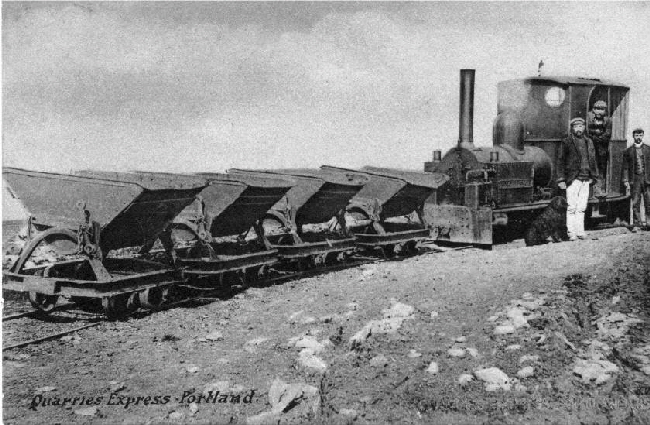
NB - Check in progress by the Portland Museum team on the location of the above image. The scene shown above is amost certainly not at the Grove but more likely on the quarry tip route adjacent to the modern Bowers Quarry site. Webteam 17 June 2025. |
Other pubs that once thrived here included The Victory, The Grove, The Eagle, The London and The Devonshire.
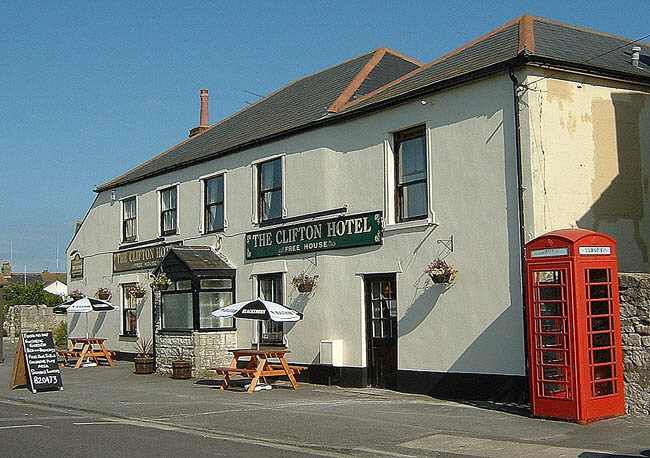
The Clifton Hotel photographed in 2003
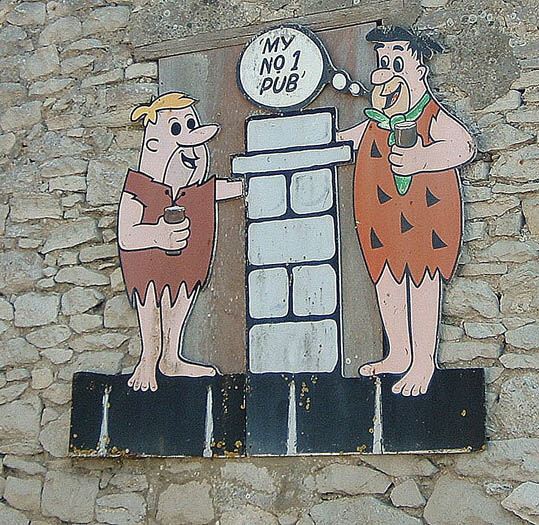
Photographed in 2003 this was part of a carnival float decoration. It has since been removed.
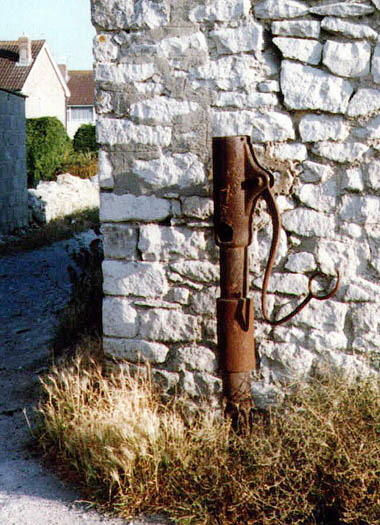
The local water supply came from this pump which survives in the grounds of The Clifton Hotel.
In August 2010 a TARDIS was left outside the pub “To help fight crime in the area” - click here for full story. Pranksters left the iconic blue box after residents vowed to set up patrols of the island to help combat anti-social behaviour.
Return To Top Of Page
THE ABANDONED POST OFFICE [1]
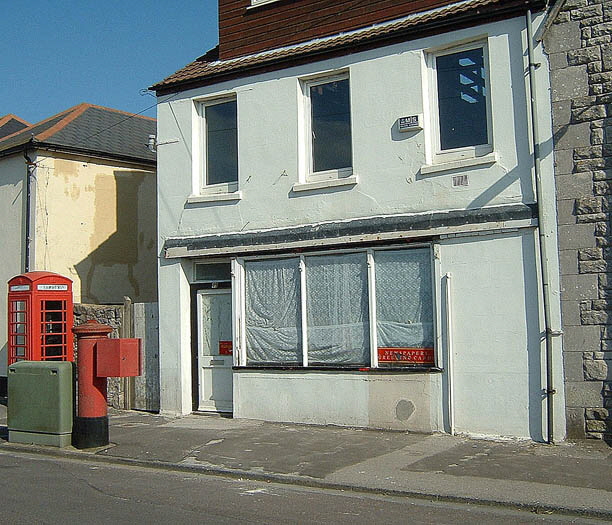
The closed general store and Post Office pictured in 2003 - a victim of dwindling demand and competition from shops and the Post Office at near-by Easton. Renovation of this property appeared to be underway - at last! - in November 2016 when the building was enclosed in scaffolding.
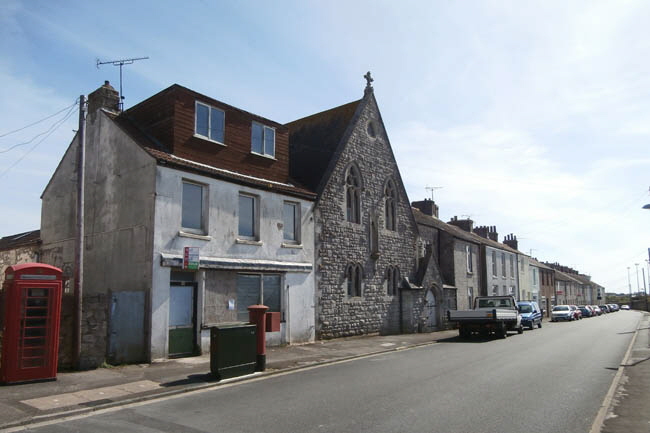
The shop in 2015 showing the closed Catholic Church next door and a view down Grove Road.
In 2015 this “SOLD” notice appeared on the shop.
Return To Top Of Page
THE CLOSED CATHOLIC CHURCH [1]
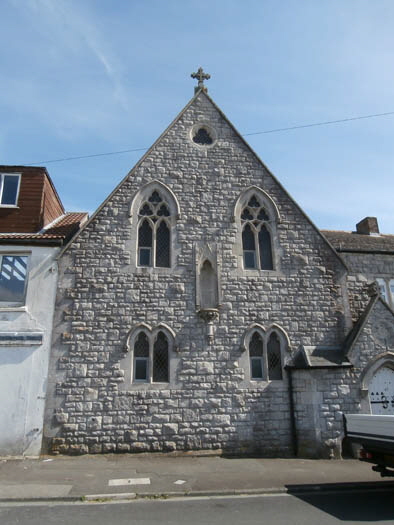
There is a detailed article about this church and its history here. Briefly, it was built in 1868 to serve the large influx of Catholic workers who were arriving to staff the nearby prison and work on the construction of the Portland Breakwater, the Grove Prison and the Verne Citadel. The church was declared redundant in 2008 due to falling number of Catholics in the area and the building was sold in 2011. The status of the church and the poor state of its interior are described here. (NB this link exists; however; it was returning a mismatched security alert when tested on 17 June 2025.
|
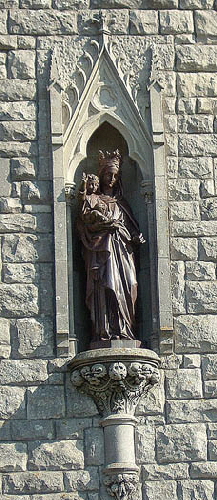
|
|
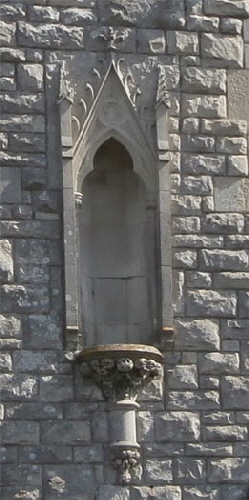
|
|
2003
|
|
2015
|
|
A case for Poirot perhaps - “The Case of the Missing Statue?”
Return To Top Of Page
AUGUSTA ROAD BOMBING DEATHS [2]
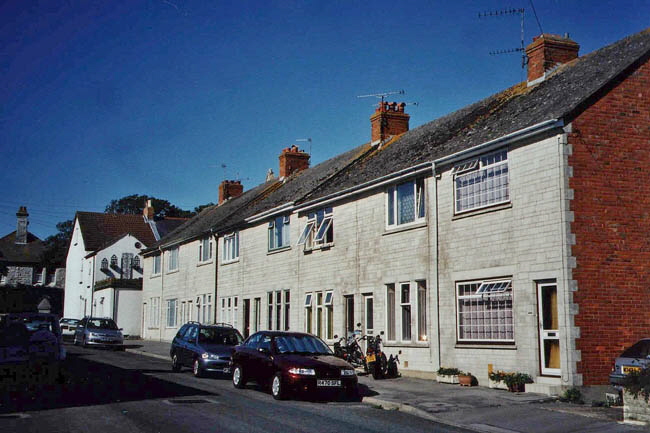
On April 12th 1941 a German bomb fell on houses on the right of Augusta Road seen in this picture. The row of terraced flats were later built to replace the bomb damaged houses.

From The Dorset Echo 12th April 2015.
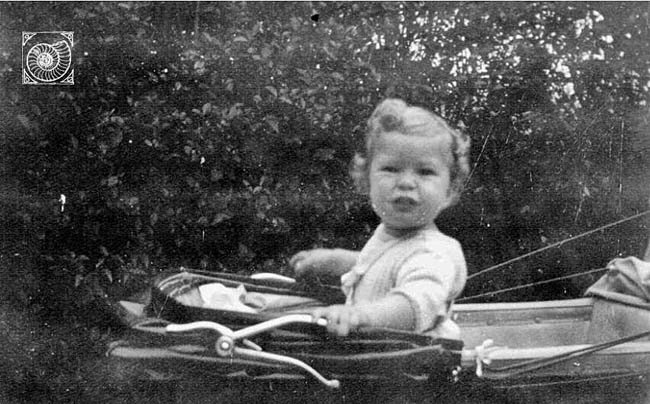
Gerald Harding survived a bomb hit on his home in 14 Augusta Road near The Grove on 12 April 1941. His mum Kathleen, his dad Frederick, his sister Rachel and Mr McIver the lodger were all killed. Gerald was brought up by Sarah White Burgess and her daughter Ann in Wyke Regis. It was reported that Gerald escaped death because a large roof spar fell across his pram and protected him from the debris of the roof.
Baby Rachel Harding killed by a German bomb 12th April 1941.
Frederick Harding, father of Gerald and Rachel, who was killed in the Augusta Road bombing.
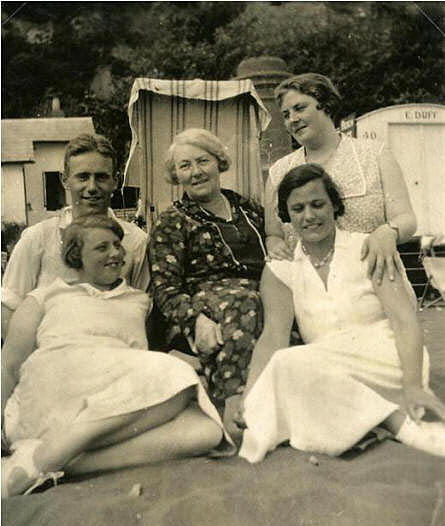
Right front is Kathleen Burgess who later married Frederick Harding. Kathleen was killed in the Augusta Road bombing.
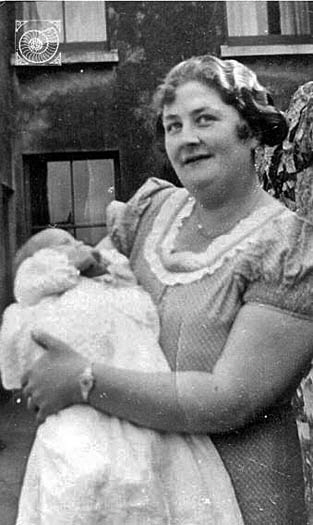
Photo taken 18th February 1938 at Moorefield Road, Easton showing Kathleen Harding (nee Burgess) holding baby Rachel. Both were killed in the Augusta Road bombing.
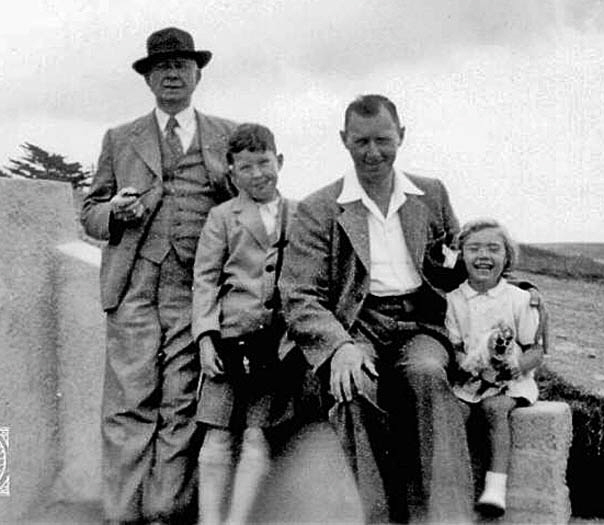
Gerald Harding (second from left) with his maternal grandfather Lt. Cdr. Joseph Mills Burgess on left.
Return To Top Of Page
A CLOSED SHOP [3]
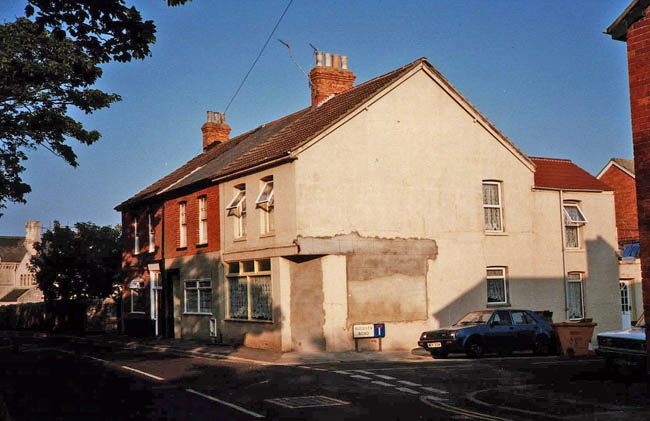
This local shop on the corner of The Grove and Augusta Road closed in the late 1980s and is seen here being converted into a private house. Below we see the conversion completed.
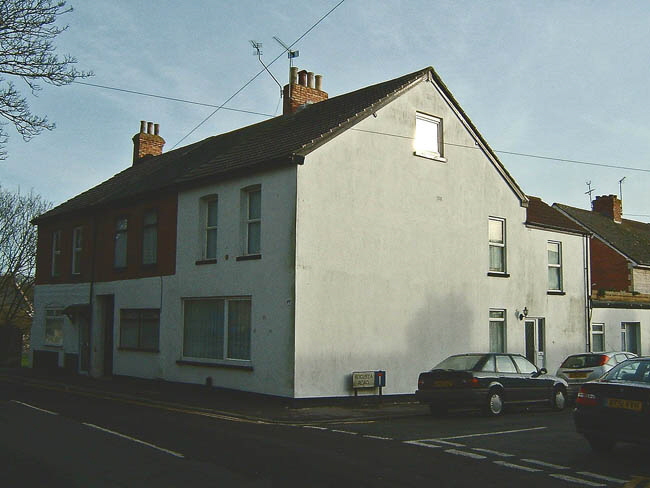
Return To Top Of Page
RUFUS WAY ESTATE [5]
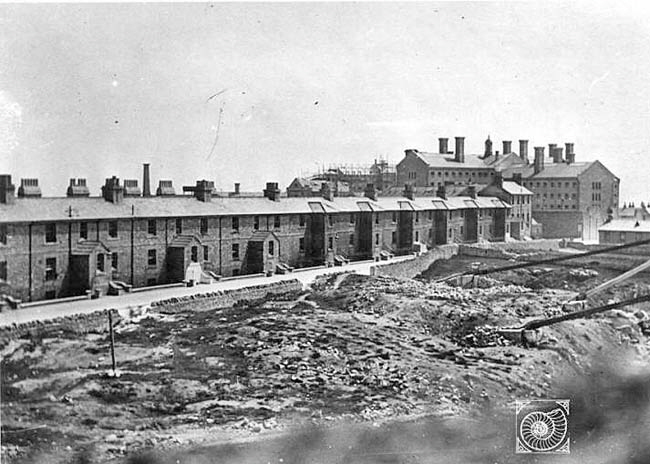
The Rufus Way estate was built in the 1980s on a disused quarry which is shown in the above picture. It stands on the bend in Grove Road where the road heads south towards the YOI.
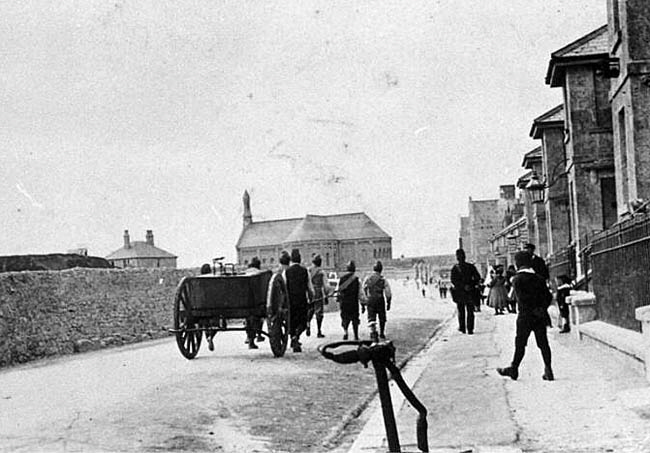
The estate now stands to the left of the wall behind the prisoners in this old picture.
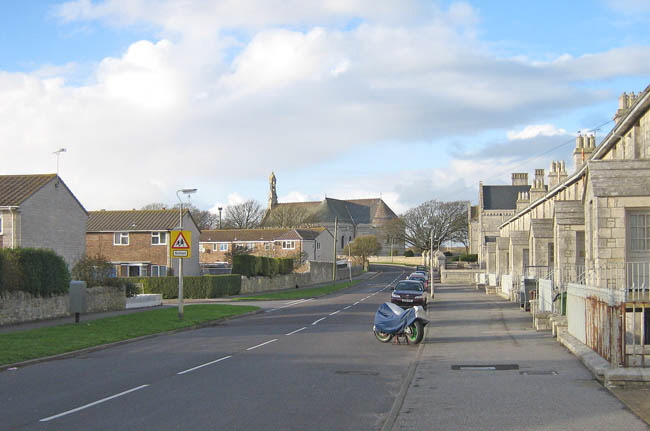
This modern picture shows the estate on the left. I rented a house on the estate in 1990 for a year.
Return To Top Of Page
LITTLE FRANCE QUARRY AND CAVE SYSTEM [6]
The hole in the quarry wall seen below gives access to one of the largest cave systems on Portland. It is reputed to go at least 100 metres with several twists, turns and caverns.
I have not explored this system in part because the entrance is difficult to reach over the huge pile of domestic waste that has been illegally dumped in the quarry.
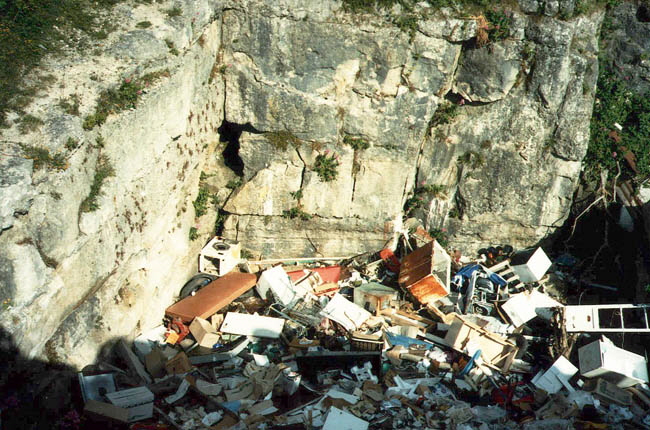
The cave system entrance in about 1990.
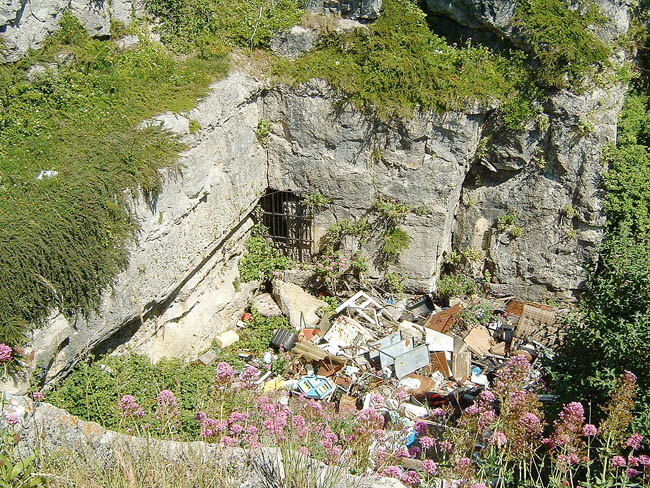
The cave system entrance barred in 2003. There is a detailed description of this cave here.
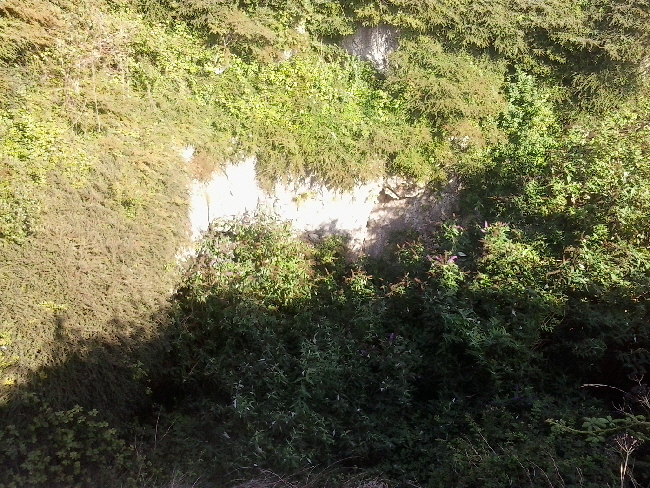
By 2015 the existence of this huge cave system was hidden by bushes which have grown amongst the household rubbish.
In the area around these old quarries are a large number of allotments.
Also in this area south of The Grove are a collection of scrap cars.
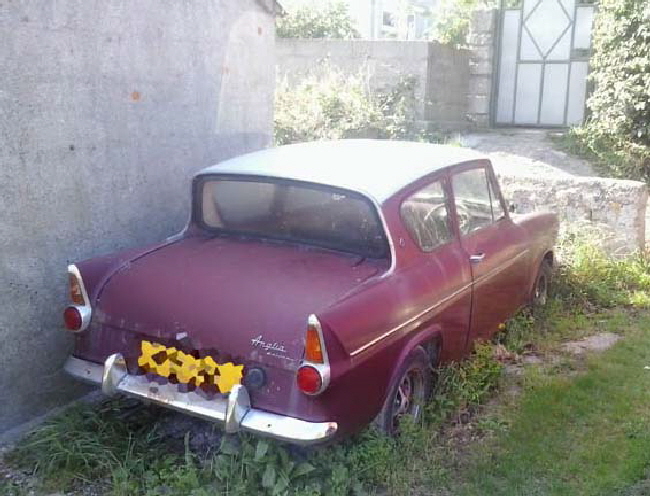
This bought back memories of owning one of these Ford Anglias in the 1970s. I bought it for £30 and got three year’s driving out of it before it went to the scrap heap.
Return To Top Of Page
St PETER’S ‘PRISON’ CHURCH [6]
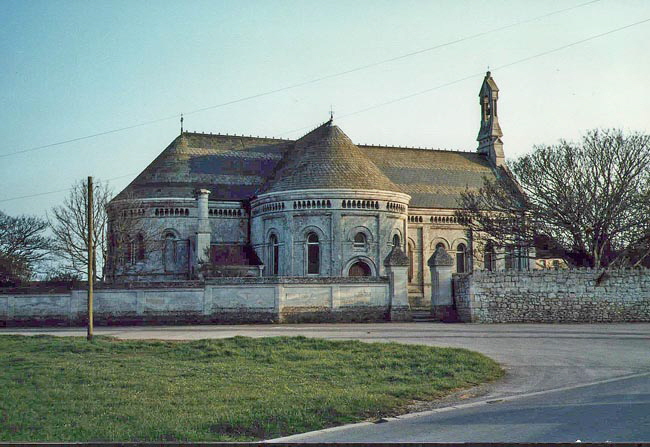
St Peter's Church dominates the area north of Grove Road. Built for use of the Grove Prison, it was partly decorated by prisoners from Portland and Dorchester.
The story of this church is told on Ashley Smith’s excellent website - please click here.
The construction and decoration of the church was done by convicts from The Grove (Portland) and Dorchester prisons. The pulpit and lectern were also made by prisoners.
The mosaic floor was made by Constance Kent who was sentenced to life imprisonment for murder and was bought over from Parkhurst Prison on the Isle of Wight to carry out this work.
The polished cross is slightly shaped and appeared to show the Crucifixion when positioned in the correct angle to lighting. Whether this was deliberate or accidental is not known.
The church was declared redundant in 1973 and became privately owned and there has been no private access since then. There was a proposal to turn the church into a casino. However, Portlanders still have a strong but diminishing leaning towards Methodism and public pressure stopped Portland becoming the Monte Carlo of Dorset.
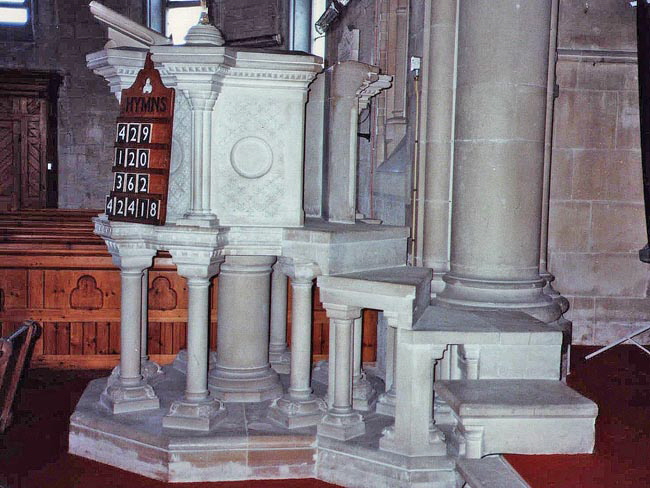
My picture taken in 1989 shows the pulpit and below we see the stained glass windows.
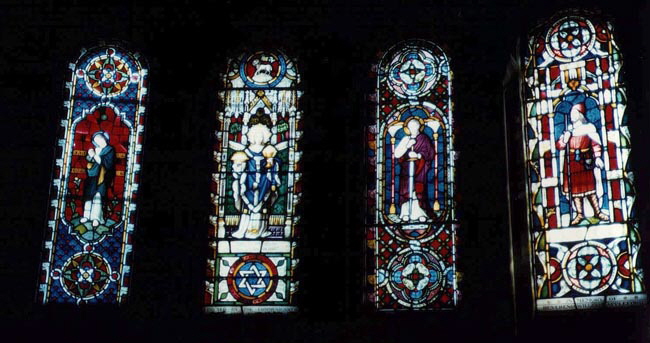
Return To Top Of Page
GROVE SCHOOL [7]
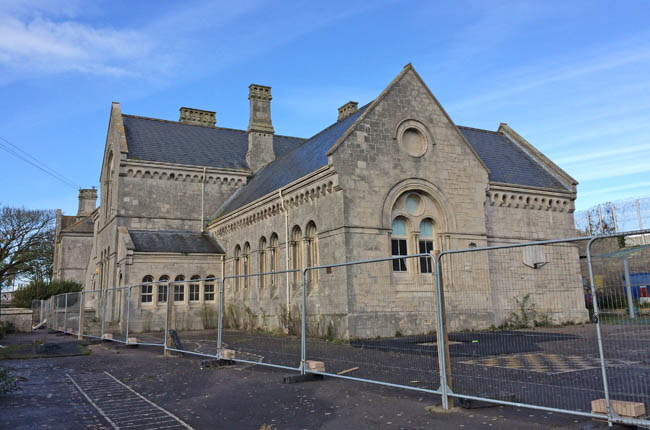

According to Eric Ricketts in his book “The Buildings of Old Portland” Grove School was built in about 1870 and Ashley Smith records it as being opened in 1872. It closed in 2014.
In September 2010 the school was temporarily closed because high levels of the radioactive gas Radon were found - see here.
In recent years it has been home to “Little Stars Pre-School”.
This Victorian house was the dwelling of the Grove Prison Assistant Governor.
Return To Top Of Page
ALMA TERRACE [9]
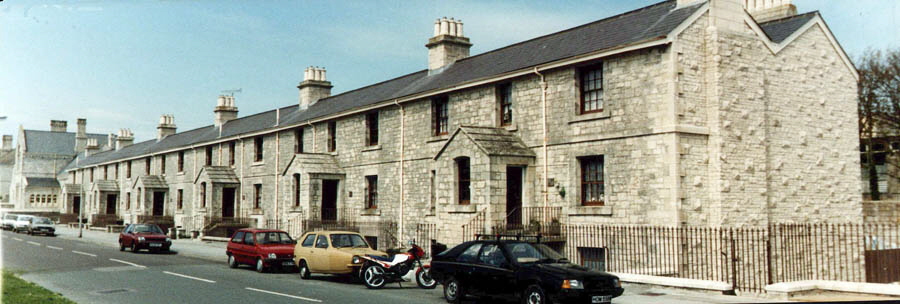
Alma Terrace was built in 1854 and was used to house staff at the nearby Grove Prison. This picture is from the early 1990s before a huge security wall was built to the right of these houses and this extended down to the prison main entrance.
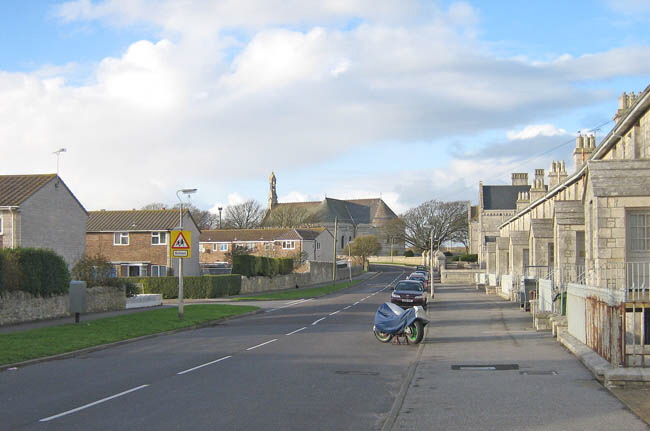
This view up Grove Road shows Alma Terrace on the right. On the left is the Rufus Way estate. This estate is built on an abandoned quarry. In the distance we see St Peter’s church.
The above picture shows the previous modern view as it was about a century previously. Convicts are trundling a cart up Grove Road passing Alma Terrace on the right and the quarry on the left is where Rufus Way now stands.
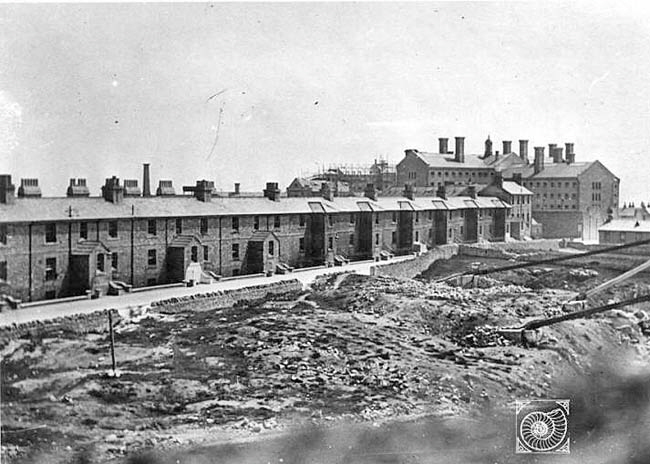
This view from about a century ago shows Alma Terrace in the background with the abandoned quarry in the foreground upon which the relatively recent Rufus Way estate was built.
Notice in the above picture that Alma Terrace was longer in those days and extended almost down to the prison main entrance.
This picture from 2003 shows building work in progress within the YOI and it was around this period that the outer high security wall was extended.
I took this picture standing a little way off Grove Road (The Grove) to show the dominating and forbidding security wall adjacent to Alma Terrace. I am standing very close to the spot where The Grove Inn once stood as can be seen by comparing the background buildings of the prison in the picture below.
There were once six public houses in The Grove whose business relied in various ways on the presence of the prison. They were frequented by prison staff, visitors to the prison and those who came all the way from London just to watch the prisoners working in the nearby quarries.
Return To Top Of Page
GROVE PRISON FARM [9]
This area was once a large quarry worked initially by prisoners. In recent decades it has been a farm worked for and by the Borstal and recently by the Youth Offenders Institute.
It’s influence on nearby residents has been a strong smell of pig manure which drifts over the area.
Return To Top Of Page
Keywords Clifton Inn, Catholic Church, Augusta Road Bombing Deaths Gerald Harding Dorset
|